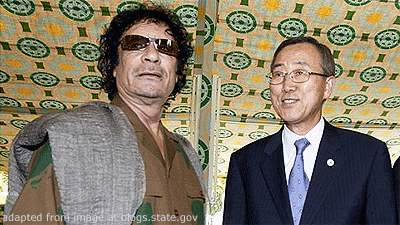Experts: what Gaddafi's death means to Russia

On Thursday it was announced that Colonel Muammar Gaddafi was killed in the town of Sirte after he was captured by rebels on the outskirts of the city.
The Libya's regime change will deeply affect Russian businesses in the region. Contracts will have to be renegotiated, and not always with sympathetic local companies and authorities.
Russia is set to lose contracts
Vice-president of International Crisis Group, Alain Deletroz, told Kommersant that "in the new Libya, Russian companies will not feel as free as during Gaddafi's reign," adding that the best contracts would be given to countries who supported the rebels the most.
Other experts say that Russia will have to hold talks with those countries, rather than the rebels.
"At best Western companies will invite Russian companies as partners," editor in chief of Russia in Global Affairs magazine Fyodor Lukyanov told Kommersant. "The British, the French, the Italians did not risk their money, reputation, etc to then share the Libyan market with companies of the countries who did not take part in the operation."
Russia a key player
Georgy Mirsky, leading fellow of the World Economy and International Relations Institute, however, thinks that Russia played a big part in overthrowing Gaddafi.
"In reality, Gaddafi's regime fell a long time ago, and the colonel's death was just its death-throes," he told Komsomolskaya Pravda.
"His death was a full stop for an absolutely artificial regime that did not fit the spirit of the times, or the 21 century in general. Gaddafi lost everything. Now an acute fight for power will start. Those, who are in the national transitional council, are unlikely to keep their positions for long."
"Speaking of Russia, Libyans should remember that namely thanks to it, Gaddafi was removed from his Olympus. If in March, Moscow did not abstain in the UN Security Council vote, then the colonel would still be in power now. Practically we gave the Western allies an opportunity to hold this operation that started with a set up of a no-fly zone over the country, and ended with a bombing of all of Libya and the rebels' win with the help of France and Great Britain. But without the fateful decision by Russia to abstain from the vote, history could have been completely different."
NATO finished Gaddafi
Andrei Fedyashin, RIA Novosti's political analyst, thinks that NATO played too big a role in the whole affair.
"It is indicative that the former leader of Jamahiriya and dictator died not in a fight with the rebels, but as a result of NATO's aviation's latest 'surgical strike'," he wrote.
"Thus NATO put a full stop where the bloc has no right to sign: no one gave NATO sanction to hunt Gaddafi and bomb the suburbs of Sirte under siege."
People will mourn
President of FIDE and former head of Kalmykia, Kirsan Ilyumzhinov, told RIA Novosti the world would be upset by the former Libyan leader's death.
"If it is true, then his death will be seen as a misery in many countries. People understand the real undercurrents of this war, where he fought not only against the rebels, but against NATO forces too," Ilyumzhinov said.
Ilyumzhinov visited Libya as part of his tour of Africa as FIDE president and played chess with Gaddafi and his son.
War in Libya will go on
Yevgeny Satanovsky, president of Middle East Institute, told Komsolskaya Pravda that there is and will be a civil war, just like it goes on in Iraq even after Saddam Hussein was executed.
"By the way, with Gaddafi three-quarters of the oil went to Europe, and the contracts were allocated to Western companies (plus China and a little bit to Russia), arms were bought from the West and a little bit from Russia and China. It will not go on."

